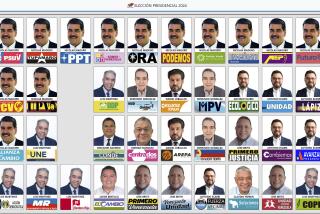LATIN AMERICA : Scandals Eclipse Issues in Costa Rican Election
- Share via
SAN JOSE, Costa Rica — Jose Maria Figueres has one of the best assets possible--and one of the worst liabilities imaginable--as he campaigns to become the next president of Costa Rica.
Figueres, running neck-and-neck against businessman Miguel Angel Rodriguez, is the son of the national hero who is credited with founding modern Costa Rica, an army-less state with a strong history of democratic rule in marked contrast to the rest of Central America.
But Figueres also was forced to spend much of the campaign season embroiled in a trial over his alleged participation in the death-squad murder of a drug dealer 21 years ago. That kind of skeleton in a candidate’s closet would be enough to destroy many a political career. Yet Figueres has been able to capitalize on his family’s name, plus rely on the powerful machinery of his National Liberation Party, to stay at the head of the race.
Costa Ricans vote for president and all 57 members of the Legislative Assembly on Sunday in elections that are expected to be peaceful and free of fraud.
The campaign, on the other hand, has been the dirtiest in recent memory, according to analysts here, with the trading of insults and the airing of scandals far outweighing any serious discussion of issues.
Any major differences between the two candidates’ centrist platforms have been obscured by the fray. Figueres, echoing his father, Jose (Don Pepe) Figueres, favors a stronger state role in Costa Rica’s legendary welfare programs and opposes privatization of government businesses.
Rodriguez, who represents the ruling Social Christian Unity Party, is an unabashed advocate of neo-liberal, free-market reforms implemented by outgoing President Rafael Angel Calderon, and has pledged to deepen those measures by loosening state regulatory practices and lowering tariffs to promote trade.
Critics argue that the government’s austerity measures, while reviving economic growth, have hurt the poor and weakened the very social programs that form the elder Figueres’ legacy. Don Pepe Figueres, who abolished the army, gave women the vote and built universal education and health care, came to power after leading Costa Rica’s 1948 revolution against populist President Rafael Calderon Guardia--father of today’s outgoing president.
It is the scandals that seem to have dominated the campaign.
Figueres, 39, a former agriculture minister trained at Harvard and West Point, last year sued the authors of a book that claimed he participated in the execution of a small-time marijuana dealer in 1973. The libel trial, which riveted Costa Ricans for weeks, ended with the acquittal of the book’s authors. But a former police captain who said he witnessed the murder and was quoted in the book was convicted of slander. Figueres all along denied a role in the murder.
Still, questions of character raised by the trial are believed to have eroded Figueres’ onetime substantial lead. Polls now show Figueres and Rodriguez in a statistical tie, with 13% of Costa Rica’s 1.7 million registered voters undecided.
Rodriguez, 54, an economist with a degree from Berkeley, was implicated in the export of tainted meat to the United States in the 1980s. Charges filed in a U.S. federal court were eventually dropped, but Rodriguez’s meat company was fined.
Each candidate has sought to exploit his opponent’s troubles. Rodriguez ran advertisements that questioned Figueres’ trustworthiness and emphasized his lack of experience. Figueres accused Rodriguez of stooping to threats and intimidation to get votes.
More to Read
Sign up for Essential California
The most important California stories and recommendations in your inbox every morning.
You may occasionally receive promotional content from the Los Angeles Times.














